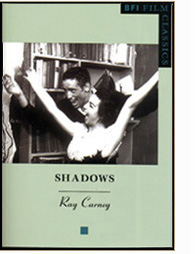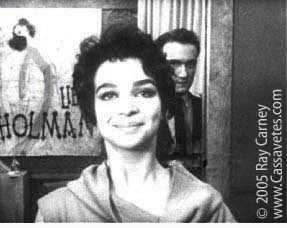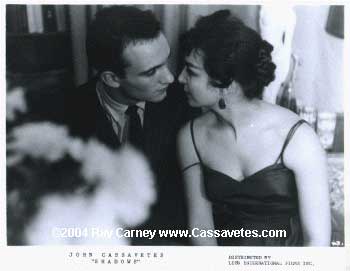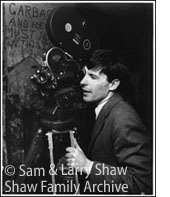|  ....There
is never anyone to blame in Cassavetes' work. There are no villains in
his films; no good guys or bad guys. Everyone is in-between. If Lelia,
Tony, Bennie, Hughie, and the other characters in Shadows have
problems, they themselves have created them, and they themselves must
solve them. ....There
is never anyone to blame in Cassavetes' work. There are no villains in
his films; no good guys or bad guys. Everyone is in-between. If Lelia,
Tony, Bennie, Hughie, and the other characters in Shadows have
problems, they themselves have created them, and they themselves must
solve them.
In his work the problems characters
have are never outside, but within the characters themselves. In their
different ways, each of Shadows' characters is playing a role
that is false to his or her true self–trying to be something
he or she is not.
Tony wants to be a "stud;" Bennie wants to be "cool;" Hughie wants to
be the strong, protecting, older brother; Lelia wants to pretend that
race doesn't matter and that sex has no emotional consequences.
The lies that are important
in Cassavetes' films are never the ones we tell others, but those we tell
ourselves. Of course, when we fool ourselves, when we are false to our
true needs and desires, we are always the last ones to realize it.
As in classic Greek drama,
each of Cassavetes' films ends with a moment of insight or self-recognition.
Characters discover something about themselves–not by thinking
but by listening to their feelings. One day they finally hear a little
voice
of discontent that may have been nagging away for years, and, if they
are lucky, wake up. Shadows ends with four recognition scenes.
Lelia, Ben, Hugh, and Rupert each realize something about how they
have been
false to themselves. Cassavetes is a very spiritual artist. All of his
work is about learning to hear that still, small voice. What is wonderful
is that he never gives up on even his most doomed characters. He is an
artist of hope–a poet of the miraculous, transforming power
of love and grace....
* * *
 The
central metaphor in Shadows
involves a comparison of the "masks" we wear in public with the "faces"
we hide beneath them. Characteristic of Cassavetes' rhetorical understatement,
the image surfaces explicitly at only two points: when Ben studies a "mask"
in the Museum of Modern Art sculpture garden, and in the tilt shot framing
an African mask that precedes Lelia and Tony's post-coital conversation.
In both cases, Cassavetes' camerawork implicitly asks us to compare the
mercuriality of living expressions with the stasis of sculpted ones.
(As
a sidelight, I might add that neither of these scenes was present in
the
"improvised" version of the film. Both were added during the scripted
reshooting done two years later–suggesting that it probably
took Cassavetes himself a couple years to fully understand the meaning
of his own work.) The
central metaphor in Shadows
involves a comparison of the "masks" we wear in public with the "faces"
we hide beneath them. Characteristic of Cassavetes' rhetorical understatement,
the image surfaces explicitly at only two points: when Ben studies a "mask"
in the Museum of Modern Art sculpture garden, and in the tilt shot framing
an African mask that precedes Lelia and Tony's post-coital conversation.
In both cases, Cassavetes' camerawork implicitly asks us to compare the
mercuriality of living expressions with the stasis of sculpted ones.
(As
a sidelight, I might add that neither of these scenes was present in
the
"improvised" version of the film. Both were added during the scripted
reshooting done two years later–suggesting that it probably
took Cassavetes himself a couple years to fully understand the meaning
of his own work.)
However, the most resonant
occurrences of masks in Shadows are not in visual images, but
in the characters' behavior. Long before Ben calls attention to the
MoMA
mask, a viewer is made aware of how he wears an even subtler and more
insidious mask–one that he is not aware of and that he can't
remove–the
mask of hipness, archness, and irony (a force within American culture
that is still clearly being felt today). He hides behind his sunglasses,
leather jacket, and beat-generation poses. Though Ben scoffs at the pretentiousness
of a literary party he attends, Cassavetes makes a viewer realize
that
he plays a role at least as hollow as that of the poseurs who babble
about
"existential psychoanalysis." His "cool-man-cool" role-playing is an
attempt to insulate himself from emotional vulnerability or involvement.
That
is why he spends his time cruising for pickups and spoiling for fights.
As long as he keeps moving from girl to girl, he knows no deep emotional
claims will be made on him or enduring commitments required. As long
as he keeps fighting, he won't have to really interact. He won't have
to
take off the mask and reveal the insecurities underneath it.
 Hugh,
Lelia, and Tony are also mask-wearers, though less obviously. As a
professional jazz musician whose
career has failed to take off, Hugh has been reduced to playing clubs
full of drunks and to introducing a chorus line to get on stage at
all.
But as deeply hurt as he is by the compromises he has made, he puts on
a brave front for his brother, sister, and Rupert, who depend on him
for
both emotional and financial support. His stoical stance is one that
many of the male characters in Cassavetes' other films will adopt–a
pretense of male poise and confidence that covers up feelings of inadequacy
and
self-doubt. Lelia has found another way of masking her pain and covering
up her vulnerabilities. After making the mistake of thinking that
sex
can be free from emotional complications and being profoundly hurt by
the consequences, she goes to the other extreme, withdrawing into
a camouflaging
flirtatiousness, flamboyance, and self-dramatizing theatricality calculated
to let no one get near her emotionally. Tony is also a mask-wearer.
He
retreats from intimacy behind the role of wise male protector. He is
too busy proving to women how experienced he is, how much he knows
and feels,
ever actually to allow himself to learn or feel anything. Hugh,
Lelia, and Tony are also mask-wearers, though less obviously. As a
professional jazz musician whose
career has failed to take off, Hugh has been reduced to playing clubs
full of drunks and to introducing a chorus line to get on stage at
all.
But as deeply hurt as he is by the compromises he has made, he puts on
a brave front for his brother, sister, and Rupert, who depend on him
for
both emotional and financial support. His stoical stance is one that
many of the male characters in Cassavetes' other films will adopt–a
pretense of male poise and confidence that covers up feelings of inadequacy
and
self-doubt. Lelia has found another way of masking her pain and covering
up her vulnerabilities. After making the mistake of thinking that
sex
can be free from emotional complications and being profoundly hurt by
the consequences, she goes to the other extreme, withdrawing into
a camouflaging
flirtatiousness, flamboyance, and self-dramatizing theatricality calculated
to let no one get near her emotionally. Tony is also a mask-wearer.
He
retreats from intimacy behind the role of wise male protector. He is
too busy proving to women how experienced he is, how much he knows
and feels,
ever actually to allow himself to learn or feel anything.
Cassavetes' understanding of
expression was an actor's. That is to say, for him, there was no essential
difference between the expressive situations of acting and of life: What
happened in one had its equivalent in the other. The artistic impoverishments
of timid or derivative forms of acting were inextricably linked in his
imagination with the disappointments of timid or derivative ways of living;
and, conversely, the aesthetic excitements and challenges of original
and brave acting were indistinguishable from the stimulations of original
and brave living.
He understood that people
wear masks in life and hide behind dependable roles in their relationships
with others for the same reasons actors do in their performances. It
is safer and more comfortable to play a fixed role than to make oneself
genuinely
responsive to the shocks and jars of an open-ended relationship–on-stage
or off-. A related parallel between bad acting and bad living, in Cassavetes'
view of it, is the desire to "star" rather than interact. Like Jack Nicholson,
Meryl Streep, and Harvey Keitel (three of America's most over-rated
actors),
we want others to respond to our emotional pacings and emphases, rather
than making ourselves responsive to them.
 Ben's
beat generation costume (black leather jacket and sunglasses even
indoors and at night), affectless
tones (disillusioned, self-pitying, and already burnt-out at age 21–"Maybe
I'll join a little group in Vegas"), and Tom-catting (forever on the
prowl for a different girl every night) allow him to be the long-running
star
of his own one-man road show, but by the same virtue, they deny him possibilities
of emotional openness to or involvement with anyone other than himself
and his own problems. Lelia's self-centered self-dramatizations are more
inventive and interesting than Ben's monotone posturing, but ultimately
no different from it. Her Garboism (or Meryl Streepism) cuts her off
from experience in the same way his Brandoism does: it gives her star
billing
in a repertory company in which she plays the most important part, lets
no one upstage her, steal her scenes, or get within a mile of her emotionally. Ben's
beat generation costume (black leather jacket and sunglasses even
indoors and at night), affectless
tones (disillusioned, self-pitying, and already burnt-out at age 21–"Maybe
I'll join a little group in Vegas"), and Tom-catting (forever on the
prowl for a different girl every night) allow him to be the long-running
star
of his own one-man road show, but by the same virtue, they deny him possibilities
of emotional openness to or involvement with anyone other than himself
and his own problems. Lelia's self-centered self-dramatizations are more
inventive and interesting than Ben's monotone posturing, but ultimately
no different from it. Her Garboism (or Meryl Streepism) cuts her off
from experience in the same way his Brandoism does: it gives her star
billing
in a repertory company in which she plays the most important part, lets
no one upstage her, steal her scenes, or get within a mile of her emotionally.
Like bad actors, in their
different ways, Ben, Lelia, Hugh, Rupert, and Tony attempt to get
their acts together
and work up routines so good they won't ever have to depart from them.
Everything Cassavetes stood for was opposed to this sense of "canning"
the self or its performances. He saw life and acting not as about getting
your part down so pat that you'd never have to think on your feet, but
as a process of opening yourself up so completely you could never say
in advance where you were going to come out or what you might discover
along the way. To invoke Cassavetes' momentary alter ego–you
must
"break your pattern."
 The
issue goes beyond being open or closed to others; what matters is whether
one has an open or closed identity. What's really wrong with designs for
living is that they represent dead-ends for development. Cassavetes subscribes
to a state of radical ontological open-endedness, played out in acts of
continuous self-revision. The deepest problem with Ben's, Tony's, Lelia's,
and Hugh's mask-wearing and role-playing (both as actors and as characters)
is that they represent efforts to formulate fixed, finished identities.
For Cassavetes, to be finished in this way is to be finished in every
other as well. At its best and most exciting, the self is not only unformulated,
but unformulatable. You can never close up shop on who you are. Living
begins at the very moment you dare to leave the scripts of life behind
and begin to improvise on the margins.... The
issue goes beyond being open or closed to others; what matters is whether
one has an open or closed identity. What's really wrong with designs for
living is that they represent dead-ends for development. Cassavetes subscribes
to a state of radical ontological open-endedness, played out in acts of
continuous self-revision. The deepest problem with Ben's, Tony's, Lelia's,
and Hugh's mask-wearing and role-playing (both as actors and as characters)
is that they represent efforts to formulate fixed, finished identities.
For Cassavetes, to be finished in this way is to be finished in every
other as well. At its best and most exciting, the self is not only unformulated,
but unformulatable. You can never close up shop on who you are. Living
begins at the very moment you dare to leave the scripts of life behind
and begin to improvise on the margins....
To read another essay on the
relation of Shadows to Beat Generation filmmaking and Robert Frank's
Pull My Daisy, look in the Beat Movement section or click
here or here.
This
page only contains excerpts and selected passages from Ray Carney's writing
about John Cassavetes. To obtain the complete text as well as the complete
texts of many pieces about Cassavetes that are not included on the web
site, click
here.
|









